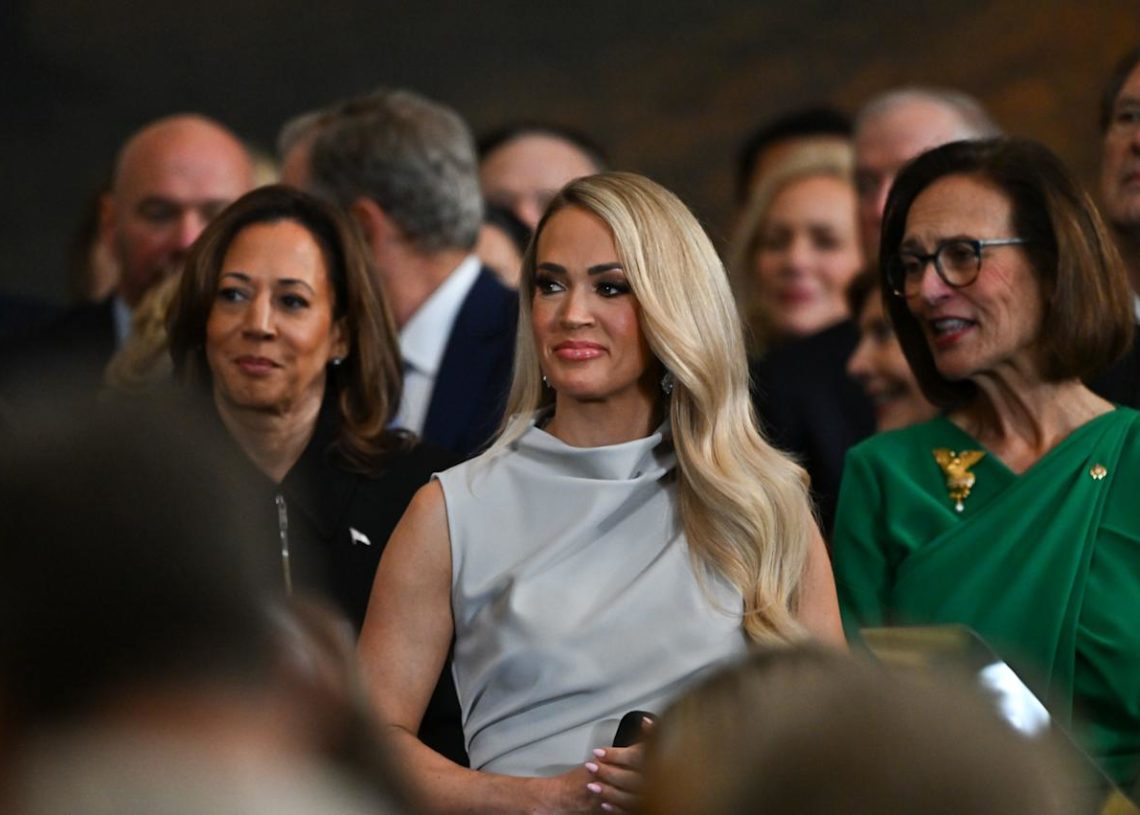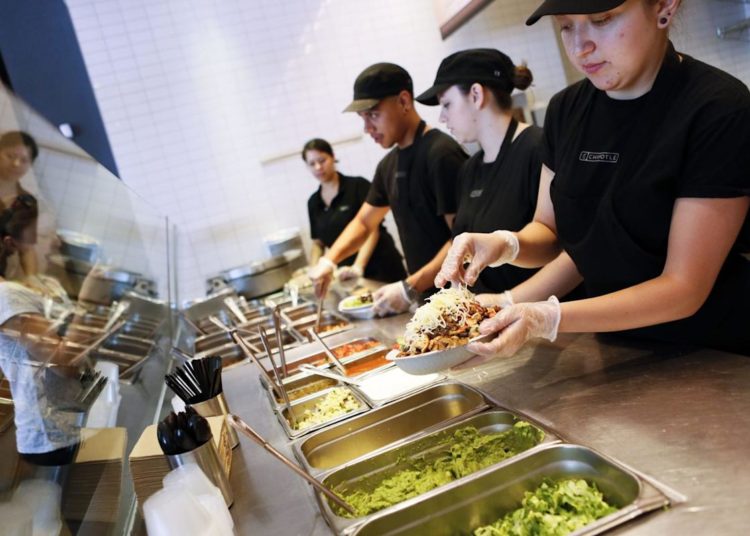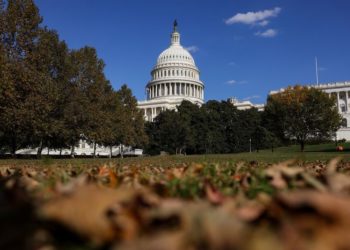LAS VEGAS
Carrie Underwood’s Vegas residency show was an exercise in visual and tonal whiplash. One minute, the country music superstar strolled the stage in shimmering fringe crooning “Cowboy Casanova” and demonstrated some sultry moves in black chaps over spiked heels for “Drinking Alone.” The next, she set a car on fire during “Before He Cheats.”
Then, having changed into an ice-blue gown, she belted the baptism ballad “Something in the Water” as her dancers clambered and writhed around on what looked like giant nails sticking out of the backdrop — a crucifixion allusion? — while sheets of liquid rained down. At one point, the star mused out loud that she wanted to take home the chopped-up junkyard sedan that her crew transformed into the spiky chair in which she perched to sing “Two Black Cadillacs,” the tale of a wife and mistress who join forces to murder the cheating man they share.
“I think I’m going to put it in the living room. … Just have my dog in my lap, crocheting in my throne,” Underwood told her near-capacity crowd in the 5,000-seat Resorts World Las Vegas theater last month, a week before the end of her three-year residency there. “It would be awesome.”
Underwood, 42, has been slipping in and out of character since May 2005, when 30 million viewers watched her crowning as the fourth-season victor of “American Idol.” Twenty years into her career, she remains a ubiquitous but elusive star, performing as Carrie Underwood, the top-selling and Grammy Award-winning musician, before retreating to her quiet family life on a sprawling Tennessee farm to become Carrie, the self-proclaimed “homebody.” So it was a surprise to some when she was announced as one of the performers at Donald Trump’s inauguration in January — catapulting the country singer into a rare mess of controversy.
In a statement in January, Underwood — who has previously referred to politics as a “nobody wins” morass that she would rather avoid — said she was honored to participate “at a time when we must all come together in the spirit of unity and looking to the future.” Her choice, just six weeks before she returned to “Idol” in March, sparked furious backlash from critics and fierce defense from fans.
While viewership numbers are a fraction of what they were in the “Idol” early-aughts heyday on Fox, millions tune in each week to the show, now on ABC. Underwood joined as a judge this season alongside Lionel Richie and Luke Bryan, and although her publicist said she was not available for an interview for this story, it seems evident that the show not only transformed her life but also shaped her approach to her career.
The reality show that original judge Simon Cowell snippily insisted was a pure “singing competition” — that is, not a popularity contest — in fact originally served as an image-crafting boot camp that taught Underwood how to appeal to music-industry gatekeepers, make the smart song choices and dole out just enough of herself to remain a relatable yet enigmatic figure. But watching Underwood experience her most significant career backlash two decades later, it’s clear the show also taught her to rely on her own instincts and, perhaps most importantly, how to handle — or filter out — criticism. She has talked about how she competed on the show at the height of internet message boards, and so learned early the value in shutting down outside voices and continuing in whatever lane you feel will suit you best.
“It’s called the ‘post and ghost.’ You put your stuff out on the social media, and you don’t look at the comments. That’s how I live my life, man,” Underwood told the young contestants on an episode last month, advising them on how to deal with online hate. In a recent interview, she credited polarizing podcaster Joe Rogan for the “post and ghost” philosophy. “Anytime anybody thinks they’re yelling at me or insulting me or telling me I look a certain way — or I’m not enough this, or I’m too much that — they’re just yelling at the clouds. I don’t hear or see any of it.”
For all the general dismissiveness about “American Idol” nearly a quarter-century after its debut (yes, it’s still on the air; the Season 23 finale airs Sunday), the show maintains a hold on anyone who remembers when the nation gathered weekly to watch Cowell tear apart terrible singers, while nicer judges Paula Abdul and Randy Jackson sought to bolster them. At Underwood’s Vegas concert, attendees cited a variety of reasons for their attendance: They were country music fans; they were Underwood fans; she seemed like the best entertainment option on the Vegas Strip that night. But all of them remembered Underwood from “Idol.”
When the public first met Underwood in early 2005, she wasn’t exactly a novice — she had snagged a development deal with a major record label as a teenager and performed at events around her hometown of Checotah, Oklahoma. But “Idol” producers cast her as the fourth season’s wide-eyed ingenue, a 21-year-old college senior who grew up on a farm and had never been on an airplane. Cowell, notably not a country fan, was wowed by Underwood’s audition, to which she showed up in jeans and a T-shirt, and sang Bonnie Raitt’s “I Can’t Make You Love Me.”
She quickly became the front-runner with memorable country covers, and when the judges complained she was getting predictable, she sealed her victory with a bombastic version of Heart’s “Alone.” Cowell famously predicted she would not only win the show but sell more records than any previous “Idol” winner. He was correct, and while other “Idol” winners have gone on to collect multiplatinum albums, and finalist Jennifer Hudson won an Oscar, Underwood is arguably the last superstar the show produced.
At the time, though, producers played up her naïveté: When host Ryan Seacrest asked if she had seen any stars in Hollywood, and she replied that it had been too cloudy, that segment was used on air — played for laughs, though many fans found it relatable.
“I just liked her voice … and I liked that she was from a small town,” said Lindsay Fuller of Las Vegas, who runs an Underwood fan account on Instagram with more than 57,000 followers. “She’s an all-American girl, I guess you could say.”
In interviews, Underwood describes herself as awkward around crowds and strangers. That’s not exactly ideal for the authenticity-craving world of country music, where fans and executives alike place a premium on engaging personal interactions. But when Underwood won the show and landed a record deal with Arista Nashville, she had an enormous head start. Everyone in the industry watched “Idol,” and even if she wasn’t comfortable opening up, people already felt like they knew her.
Label executive Skip Bishop started at Arista as the vice president of national promotion in fall 2005, and his new boss handed him a CD with “Jesus, Take the Wheel” scrawled across the cover. This was the first single from Underwood’s debut album, and it was Bishop’s job to get country radio to play it. He anticipated a struggle. Country radio doesn’t always welcome newcomers, particularly reality TV contestants. But Underwood’s star power overshadowed any doubts. Forged by the brutal production schedule of “Idol,” she was game to put in the hours. Just a few years into her career, she was tapped to co-host the Country Music Association Awards with superstar Brad Paisley, a gig she kept for the next decade, becoming one of the genre’s most visible faces.
“She had that focus and that work ethic that matched all the God-given talent,” Bishop said. “I’ve never worked with anyone that had that combination of the shyness and the low-key-ness but also had the steel-eyed confidence that she has.”
“Jesus, Take the Wheel” lingered at No. 1 for six weeks, and Underwood’s “Some Hearts” debut album sold millions of copies, even as the country charts were squeezing out most other female artists. A subsequent single, “Before He Cheats” — told from the point of view of a betrayed woman destroying an unfaithful man’s car — could not have been more different from her first track. But Underwood embraced the persona convincingly, for a career-defining hit that showed she could tackle bitter revenge anthems as well as tender ballads. For someone still adjusting to fame, and whose stage presence was occasionally criticized as robotic, it could be easier to play a character.
“We can tell a story in country music,” Underwood said in Vegas by way of introduction to “Church Bells,” about a woman who poisons her abusive husband. “Sometimes those stories are not all sunshine and roses. Sometimes they are stormy and dark and dramatic and cinematic, and in my case, sometimes somebody gets killed. And that’s okay! You know? We all have our things.”
Bishop remembers Underwood being incredibly quiet behind the scenes — until the red light went on in the recording studio, and she just “exploded with magnetism.” Some might have seen her as standoffish, he said. But as soon as she walked onstage, or the camera turned on, she became another person.
Even when Underwood started to co-write and co-produce her albums with some of Nashville’s best writers, she shied away from country music’s autobiographical tropes in favor of lyrics from the perspective of fictional narrators. In 2017, she left Arista for Capitol Records Nashville and recorded her sixth album, “Cry Pretty,” with an unusually vulnerable title track about hiding one’s pain while pretending everything is fine. At a Nashville industry event in early 2020, the heads of her record company surprised her with a plaque when the album went platinum, and Underwood was overwhelmed.
“This is the project that I’ve done and the album that I’ve done that is the most ‘me,’” Underwood said, getting choked up. “I’m honored, and I’m humbled, and God is good.”
As Underwood built a loyal fan base, she appeared careful and consistent with the few details she shared about her life — mainly centered on family, fitness and faith. Tabloids remain fascinated by her marriage to professional hockey player Mike Fisher — they wed in 2010 — and their two young sons. She carved a brand in the wellness space with a fitness clothing line and app, and a book, “Find Your Path,” in which she was candid about how she struggled with strangers critiquing her physical appearance on “Idol.”
She has always been open about her Christian beliefs, recording the gospel album “My Savior” and starring in a web series with Fisher for a Christian organization, where they discussed their fertility challenges. This season on “Idol,” the show had its first-ever Easter celebration where contestants sang songs of faith. (The show’s publicists did not respond to a question about whether Underwood’s presence influenced that episode.) “I know how difficult it is to come into the entertainment industry and bring your faith with you,” she told a pair of contestants who sang a worship song. “It is a brave thing to do because there are a lot of — a lot of — outside forces that are going to tell you not to do that.”
Like many country artists, Underwood has mostly avoided sharing her thoughts on specific current events. She voiced her support for same-sex marriage in 2012 — but when she released a thematically resonant song, “Love Wins,” years later, she maintained that it was more generally about hope for a better world. She also emphasized that her song “The Bullet,” about the devastating aftermath of gun violence, was not a political message. She did not respond to the internet uproar in 2021 when she and her husband appeared to support anti-mask posts on social media during the covid-19 pandemic.
“I try to stay far out of politics if possible, at least in public, because nobody wins,” Underwood told the Guardian in 2019. “Everybody tries to sum everything up and put a bow on it, like it’s black and white. And it’s not like that.”
Hence, the clamor when Underwood appeared to abandon that stance by gracing the stage at the Trump inauguration. (Technical audio difficulties at the U.S. Capitol forced her to perform “America the Beautiful” a cappella.) Though the world of country music skews more conservative than most quadrants of show business, Underwood’s choice was viewed as a betrayal from longtime genre-agnostic “Idol” fans, especially those in the LGBTQ+ community aggrieved by the new administration’s push to roll back equal rights. An Underwood fan account made headlines by switching country star allegiances and becoming a Megan Moroney fan account instead.
Constantine Maroulis, a popular “Idol” Season 4 finalist and Tony Award nominee, knows members of Underwood’s inner circle. (She has maintained the same career manager and tour manager from her early post-“Idol” career.) He assumes that her team analyzed the pros and cons and anticipated the reaction to an inauguration appearance. He personally would have not made the same decision, Maroulis said, but he supports Underwood as a friend. As he remembers from their season, the unassuming small-town girl understood the reality of the music business.
Plus, at this point in her career, Underwood doesn’t have a lot to lose. In Nashville, some mainstream country stars, such as Jason Aldean and Brian Kelley, have become increasingly vocal about their support of Trump. And while Underwood’s singles don’t break through on the radio as they once did, she remains a sought-after duet partner — she teamed up with Aldean on one recent hit and Cody Johnson on another — who can still command TV audiences and sell concert tickets. In addition to her lifestyle brands, she has her own SiriusXM radio channel. Even if she doesn’t wear her ambition on her sleeve, those who worked with her say it is a driving force.
“She was someone to be reckoned with,” Maroulis said. The contestants formed a tight bond during their surreal experience on the show, but they never forgot they were competitors. “I love that about her,” he added. “She has a killer instinct inside of her, as well.”
Season 23 of “American Idol” has served as a love letter to Underwood, with ample flashbacks to her competition days; Maroulis appeared with several other contestants for a brief Season 4 reunion on an episode in April. Producers have tried to showcase sides of Underwood that might surprise audiences — her deep knowledge of heavy metal lyrics, her friendly verbal jabs at Luke Bryan. On a web-only series, she watches scenes from her season and offers commentary, or reads passages from her old journal.
As always, she continues to open up to the viewing public on her terms. “Idol” was barely referenced in her Vegas act, which Underwood introduced as a journey through “20 years of a career that I am so proud of” — except for a fleeting image of her on the show, displayed on the screen behind her before “Something in the Water,” a reminder of where she came from and the road she took to get here.
“From a very young age I was singing, and I would have told you in a heartbeat that this was what I was going to be doing someday,” Underwood said at one point in the show. “Thanks to so many blessings, the good Lord put me on this path. Somehow we all ended up here. And it is divine intervention for sure.”
The post The enduring enigma of Carrie Underwood appeared first on Washington Post.




